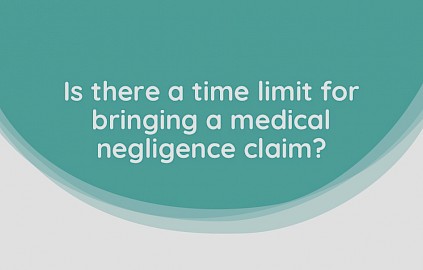Failure to manage preoperative “bridging” appropriately for patients who are taking long-term anticoagulant medication.
Some patients take long-term anticoagulant medication to thin the blood, such as warfarin. The main reasons for being on long-term anticoagulation therapy are where a patient has a history of suffering deep vein thrombosis (when a blood clot forms in one of the large veins in the leg or arm) or from pulmonary embolism (a blood clot that forms in, or travels to, the lungs), atrial fibrillation (an irregular heart rhythm) or having a mechanical heart valve.
Where such patients are faced with surgery, if they carry on taking the warfarin up to the time of surgery, they are likely to have complications with bleeding during and after surgery. This is a major risk. For this very important reason, there are national Guidelines in place to deal with this and also individual Hospital Trusts put in place their own Protocols to manage these vulnerable patients.
What should happen is that the patient stops taking their medication such as warfarin about 4/5 days before surgery and then has to have heparin injections each day leading up to the surgery. The dosage of heparin is tailored to the individual patient based upon their particular risk factors.
Claims can arise, for example because:
- The preoperative bridging guidance is not followed at all.
- The preoperative bridging guidance is followed but incorrectly, such as when the patients risks are not assessed appropriately.
- If particularly high risk patients are not appropriately monitored through their preoperative bridging program which might require admission for a few days in advance of surgery to do a full blood work up.
Failure to appropriately manage preoperative bridging, leading to bleeding after surgery can result in major vascular injuries, such as heart attack, stroke and death.
Failure to identify or act on clotting abnormalities before surgery.
Patients often have bloods tested before surgery. For example, we recovered a very large compensation sum for the family of a deceased patient where the patient had had blood tests done two days before his surgery. Although the INR result was normal, he had an abnormal aPPT result. This can indicate a blood clotting problem. This should have been rechecked when he was admitted for surgery but this was not done.
Had there been further blood tests to check the result, then this would have taken some time and it is probable his surgery would have been postponed. As it is, he had devastating complications of bleeding after surgery and it is possible that his preoperative blood status contributed to the risks of bleeding after surgery.
If the result had been checked again and was still abnormal, then it would have been important to try and correct it with treatment before surgery. In addition, the surgical team should have been made aware of the abnormal preoperative result, as this would have made them more alive to the increased risks of bleeding during or after surgery. As it was, it appeared that the surgical team were entirely unaware of the situation.
Often, mistakes happen such as this in overly busy Hospital Trust owing to lack of effective communication between nurses, clinicians and different departments, such as the haematology department and the surgical department.
Discharging a patient home without the correct medication.
There have been cases where patients who should restart their warfarin after surgery but are allowed home without this having taken place. Medication errors involving anticoagulants are within the top ten causes of claims against NHS trusts. Sometimes this may arise because there is no clear management plan when a patient is discharged from hospital to primary care. Also, there are variations across the country in how anticoagulation services operate.
At times patients are not correctly referred to an anticoagulation service when this should be upon discharge from hospital care. For some patients, there should be arrangements made for INR checks to see whether they are safely covered by anticoagulation medication again following surgery but at times there is a failure to make the appointment. In addition, there can be failures to appropriately advise the patient about the importance of their follow-up care and what needs to be done. This is a shame because with the increasing pressures on health services these days, and the breakdowns in communication that we see between hospital staff and different departments, if more care was taken to simply fully inform patients of their care needs, then they could be expected to take more responsibility for managing their care and making sure that they get what they need.
How we can help with surgical mis-management
At Medical Solicitors, we often help people who have suffered from complications of bleeding during or after surgery due to Medical Negligence. Our specialist solicitors have handled many different types of surgical medical negligence claims and have recovered large sums in compensation for injured patients.
Do contact our friendly team of specialist lawyers at Medical Solicitors about whether your treatment was reasonable or not. We can advise whatever type of surgical complication it may be. Our friendly team will speak to you free to charge to assess your case.
You have nothing to lose in speaking to us. We conduct most of our Clinical and Medical Negligence claims under ‘No Win, No Fee’ agreements, also known as Conditional Fee Agreements. So, your clients do not have to worry about how they can afford to bring claims for bleeding after surgery.
Why bring a case for negligent care related to bleeding issues?
A patient, not happy about their care, may understandably wish to bring a medical negligence claim for compensation. They may also want to try and prevent mistakes happening to other cancer patients in the future. At the end of the day, everybody needs to be able to live. Often clients will tell us that they would not have considered suing the NHS but for the fact that they have found themselves in financial difficulties and that mistakes that have happened are affecting not just them, but also their family.
We often take on medical negligence cases for families after they have lost their relative after surgery. We represent the family, including the children of the family, in such circumstances and can assist with Inquests into a death.
Please Note: At Medical Solicitors, our team specialises in handling bleeding after surgery cases involving healthcare professionals in England and Wales. We will gladly provide assistance if your case is located in either of these regions. Unfortunately, we do not handle post-surgery bleeding claims outside of England and Wales.









